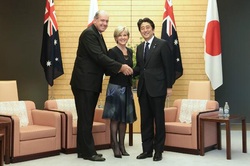 Source: Australian Embassy in Tokyo
Source: Australian Embassy in Tokyo During their Tokyo visit, both Australian ministers also called upon PM Abe, who very genially praised the work that Tony Abbott had done during his visit to Tokyo in April, and stated that he was looking forward to his up-coming Australia trip. Now, clearly this 2+2 was held for two reasons; one, to confirm the security stance of both sides on territorial issues, and two, to explore options for furthering security relations, particularly (if not downright exclusively) concerning the sharing of `marine hydrodynamic` technology – aka submarines. David Johnston for his part took a tour of the sub pens at Yokosuka to get an up close and personal look at the Soryu class, a submarine he has had his eye on for some time, and voiced his eagerness for Japanese involvement in the future submarine project ($).
Such dialogue will have been noticed in Beijing, and it may be that as Rowan Callick suggested, Australian diplomats in China are having a somewhat more difficult time of late trying to explain why Australia is pursuing defence relations with Japan so eagerly ($). Quite frankly, such questions are already plainly obvious, and it may be that the Chinese just want to hear it from Australia first. If push comes to shove, Australia is going with the side it knows best and it ain`t China, no matter how many `joint exercises` are planned between the ADF and PLA.
Not that things will be entirely trouble-free for the burgeoning Australia-Japan relationship. The news this week that Japan was considering ways in which to resume commercial whaling was met with something resembling resigned disappointment from the Abbott government and indignation from every other major party. It is not necessarily wise for PM Abe to use up the goodwill generated towards Japan by declaring that Japan will implement the one issue to which Australia (and New Zealand, for that matter) so vehemently object (kudos to Robert Ayson for pointing that out on Twitter).
The Abbott government is probably hoping that the entire whaling issue will not even be raised in press conferences, although it would be a small hope. If it is raised, and if PM Abe takes the same stance as he did in the Diet during the week, it is quite possible that the reception for him won`t be quite as warm as Minister Bishop expects. It would be far wiser to drop the entire whaling issue for the time being, and only resume it once Japan has plans in place to implement it (if, in fact, it does have plans to implement it).
PM Abe`s presence may also draw protestors from the Chinese and Korean communities in Sydney and Melbourne that object to his comments related to comfort women, the Kono statement, and war responsibility. Only recently was news made that both communities were planning to establish another bronze statue in Sydney depicting a young Korean woman, similar to that outside the Japanese Embassy in Seoul and in Glendale, California. This is to be expected, and probably already has been. What would be novel is if PM Abe addressed these protestors to both acknowledge the wrongs committed in Japan`s past, and to inform them that his government will implement collective self-defence for the benefit of allies and the region. It would be politically risky though, and very much out of character for PM Abe. It might, however, convince sceptics of Abe`s strong desire for a pro-active role by Japan to foster regional stability, and would take the wind out of the sails of the CCP argument that Abe is bent on reviving militarism.
 RSS Feed
RSS Feed